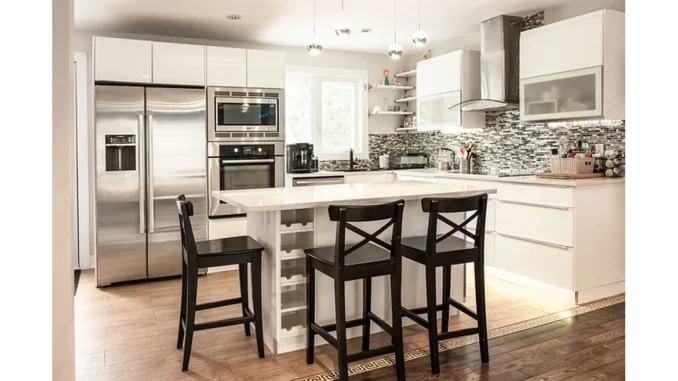
Elevating Your Home: When Kitchen Renovations Don’t Pay Off
Renovating a kitchen is often heralded as a guaranteed method to enhance a property’s value. Yet, there are situations where such updates may not deliver the anticipated return on investment (ROI). Gaining insight into these scenarios can prevent homeowners from making costly errors. Here, we explore instances where updating a kitchen might not necessarily boost property value.
The Pitfall of Over-Improvement
One of the most common missteps is over-improving a kitchen relative to the home or neighbourhood. Imagine installing high-end appliances, custom cabinetry, and luxury finishes in a modest abode. Such enhancements might not resonate with prospective buyers who are unwilling to pay a premium for features out of sync with the home’s overall value and the surrounding properties. This mismatch often results in an investment that fails to translate into a higher selling price.
Neglecting a Cohesive Design
An upgraded kitchen can quickly lose its allure if the rest of the house remains outdated. Buyers typically seek a harmonious design and consistent quality throughout the property. For instance, a state-of-the-art kitchen may not significantly elevate the home’s value if bathrooms, living spaces, or the exterior are in poor condition. Ensuring that renovations are balanced across the entire home is essential for creating a compelling and unified presentation.
Personal Taste vs. Market Appeal
Homeowners sometimes renovate their kitchens based on personal tastes rather than market preferences. While a unique design may delight the current owner, it might not appeal to potential buyers. Bold colour schemes, unconventional layouts, or overly specialised features can limit the kitchen’s appeal. Opting for neutral, timeless designs often has broader market appeal and is more likely to contribute to an increase in property value.
The Importance of Quality Workmanship
Even the finest design and materials can be undermined by substandard workmanship. Shoddy installation, visible seams, and uneven surfaces can detract from the kitchen’s perceived value. Buyers are likely to notice these flaws, leading to lower offers or reluctance to purchase. Ensuring renovations are performed by skilled professionals is crucial for maximising ROI.
Functionality Matters
A kitchen that dazzles visually but falls short functionally can be a significant turn-off for buyers. Inadequate storage, poor lighting, limited counter space, and inefficient layouts diminish the kitchen’s usability. Buyers prioritise kitchens that are both aesthetically pleasing and practical. Focusing solely on appearance without considering functionality can result in a renovation that fails to add value.
Market Dynamics
The real estate market significantly influences the ROI of kitchen renovations. In a buyer’s market, where supply exceeds demand, recouping the costs of an expensive kitchen update can be challenging. Conversely, in a seller’s market, where demand is high, even modest updates can yield a favourable return. Understanding local market conditions and timing renovations accordingly can impact property value.
The Issue with Incomplete Renovations
Partial or incomplete renovations can present a disjointed appearance. For instance, updating countertops and cabinets while leaving old appliances and flooring can create an unfinished look. Buyers may perceive the kitchen as incomplete and factor in the cost of finalising renovations into their offers. Comprehensive updates that address all kitchen aspects are more likely to enhance property value.
DIY Mistakes: A Cautionary Tale
While DIY projects can save money, they can also backfire if not executed correctly. Amateur mistakes, such as uneven tiling, poorly installed cabinets, or improper plumbing, can be glaringly obvious to buyers. These errors not only detract from the kitchen’s appearance but also raise concerns about potential future issues. Professional renovations, though more expensive, generally offer a safer bet for adding value.
Environmental and Health Considerations
Certain kitchen updates can unintentionally introduce environmental or health concerns. For example, materials that off-gas harmful chemicals, such as specific paints or flooring, can be a red flag for health-conscious buyers. Additionally, renovations that do not comply with environmental standards or energy efficiency guidelines may not appeal to eco-conscious buyers. Ensuring updates are environmentally friendly and health-safe can enhance the kitchen’s value.
Final Thoughts
Updating a kitchen can be a valuable investment, but it requires a strategic approach. Avoiding the pitfalls of over-improvement, poor workmanship, and neglecting other areas of the home can help ensure the investment translates into increased property value. By considering market conditions, functionality, and buyer preferences, homeowners can make informed decisions that enhance both the kitchen and the overall appeal of the property.


Be the first to comment